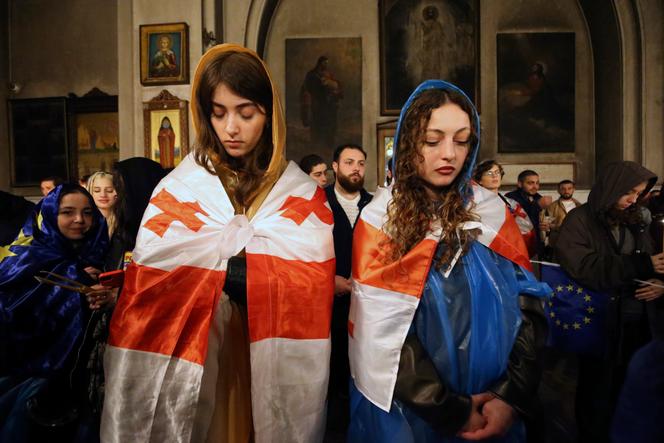


In December 2023, Georgians were ecstatic: After years of hope and an initial refusal, their country had finally been granted official candidate status for membership of the European Union, the first step on the road to possible integration. Seven months later, those hopes have stalled. "Unfortunately, the process of Georgia's accession to the EU has come to a halt for the time being," declared Pawel Herczynski, the European Union ambassador to Georgia, on Tuesday, July 9.
This decision was made at the last European Council in Brussels, on June 27 and 28. It penalizes adoption of the country's controversial "foreign influence" law, enacted in June. Copied from a 2012 Russian law, the text aims to silence independent media and civil society. It also marks a geopolitical shift unprecedented since the independence of this former Soviet republic, which is turning away from Europe and drawing closer to Russia, despite being its historical enemy. Tens of thousands of people demonstrated for weeks to prevent the adoption of the law, to no avail. Warnings from Brussels and Washington also went unheeded. In their conclusions, the EU member states denounced Georgia's "backsliding (...) de facto leading to a halt of the accession process."
EU leaders have called on the Georgian authorities to "clarify their intentions by reversing the current course of action, which jeopardises Georgia's EU path." In the face of growing repression of all forms of opposition, they also called on Tbilisi to put "an end to the increasing acts of intimidation, threats and physical assaults against civil society representatives, political leaders, civil society activists and journalists in Georgia."
In addition to the suspension of the accession process, Herczynski announced that the EU has also frozen financial support worth €30 million, earmarked for the Georgian Ministry of Defense in 2024 under the European Peace Facility. "This is just the first step, there will be others. Our direct support to the Georgian government will be limited, and we will seek to redirect [this] support to civil society and the media," explained the ambassador. "It is sad to see EU-Georgia relations at such a low point, when they could have been at an all-time high."
Since the Russian invasion of Ukraine in February 2022, the country has enacted a spectacular rapprochement with Moscow, even though the Euro-Atlantic aspiration enshrined in the Georgian constitution is a pillar of its foreign policy. At the heart of a struggle for influence between Russia and the west, Georgia's change of heart represents a victory for Vladimir Putin, and a failure for the Europeans, who are now obliged to review their cooperation.
You have 63.41% of this article left to read. The rest is for subscribers only.
